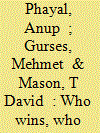|
|
|
Sort Order |
|
|
|
Items / Page
|
|
|
|
|
|
|
| Srl | Item |
| 1 |
ID:
172166


|
|
|
|
|
| Summary/Abstract |
Do UN peacekeeping forces protect civilians from harm in post-war environments? Current evidence suggests that the answer to this question is yes. But extant research mostly examines this relationship at the country-level and consequently has logical difficulty tracing decreases in civilian fatalities to actual peacekeeper activities. We would have more confidence in the ability of peacekeepers to limit harm and protect non-combatants if the reduction in violence occurred locally where blue helmets were positioned. Using original geocoded data of yearly UN deployments in four Sub-Saharan African conflicts (Sudan, South Sudan, Democratic Republic of Congo, and Ivory Coast), we find that peacekeeping units get locally deployed to violent post-war areas and they reduce the level of civilian harm almost immediately. But, in areas without violent clashes between government forces and rebels, we find peacekeeping units more responsive to civilian targeting by rebels, which indicates a reluctance among peacekeepers to confront government forces that target civilians. While host nation consent is crucial for the success of a peacekeeping mission, the findings from this study caution against nurturing illiberal regimes by failing to check government atrocities. The failure to confront government abuse can jeopardize long-term peace and reconciliation.
|
|
|
|
|
|
|
|
|
|
|
|
|
|
|
|
| 2 |
ID:
146150


|
|
|
|
|
| Summary/Abstract |
Successful management of combatants through disarmament, demobilization, and reintegration (DDR) remains one of the main challenges of post-conflict peacebuilding. While DDR is meant to contribute to a secure post-conflict environment conducive to economic and political development, the success of DDR efforts remains mixed. Unlike previous work focusing on procedural aspects or post-conflict reconstruction and development, we shift the focus to understand microlevel conditions—economic, security, and ethnic concerns—that influence ex-combatants' satisfaction with DDR. We argue that ex-combatant satisfaction with DDR should increase as individual-level economic conditions increase, as security situations improve, and as ethnic tensions decrease. We test our expectations using an original data set collected with field interviews and surveys from 122 ex-combatants in South Sudan in 2011–2012. We find that participants are more satisfied when their income-generating activity is based on DDR job training and when the UN has a large presence in their area. Concerns about political instability and an abundance of firearms make ex-combatants less satisfied with DDR.
|
|
|
|
|
|
|
|
|
|
|
|
|
|
|
|
| 3 |
ID:
168797


|
|
|
|
|
| Summary/Abstract |
Previous research has shown that the outcome of a civil war is related to conflict duration: military victory by either the government or the rebels occurs early if it occurs at all, and the longer a civil war lasts, the more likely it is to end in a negotiated settlement. The models of civil war duration and outcome that have produced these findings are built on characteristics of the civil war and less on attributes of the state itself, other than where the state lies on the Polity autocracy-democracy scale. We propose that how civil wars end varies not only between democracies and authoritarian regimes but among the different authoritarian regime types identified by Geddes, Wright, and Franz. The distinguishing attributes of these regime types—democracy, one-party, personalist, military, monarchical—should lead to different likelihood in defeating a rebel movement, being defeated by a rebel movement, and negotiating a peace agreement with a rebel movement. Results from a series of competing-risk models using the Uppsala–Peace Research Institute Oslo Armed Conflict Dataset demonstrate support for our claim that how civil wars end is partly a function of the characteristics of the regime.
|
|
|
|
|
|
|
|
|
|
|
|
|
|
|
|
|
|
|
|
|